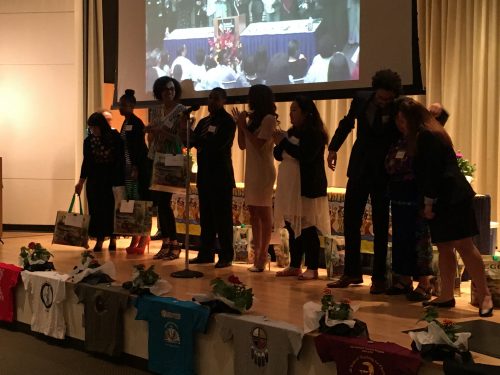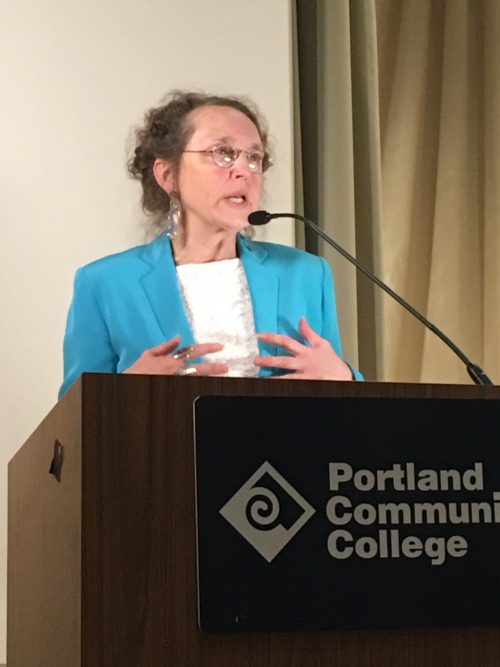This content was published: April 11, 2017. Phone numbers, email addresses, and other information may have changed.
Portland Teachers Program, a longstanding partnership, aims for transformative education
Photos and Story by Abe Proctor
In the Cascade Campus’ Moriarty Auditorium, a capacity crowd rose to its feet and spoke together in unison, first in Spanish, then in English.
“Tú eres mi otro yo. Si te hago daño a ti, Me hago daño a mi mismo. Si te amo y respeto, Me amo y respeto yo.”
Translation: “You are my other me. If I do harm to you, I do harm to myself. If I love and respect you, I love and respect myself.”
The crowd was gathered for last year’s Celebration of Students, the Portland Teachers Program’s annual graduation ceremony. The recitation was “In Lak’esh,” an ancient Mayan hymn to the interconnectedness of all human beings.
At first blush, the invocation of “In Lak’esh” might seem like a pleasant gesture, a feel-good way to kick off a happy occasion. But for the Portland Teachers Program (PTP) – the Portland area’s premier training program for future teachers of color – the poem represents the program’s heart and soul, the very essence of education itself.
“In a world that has become increasingly focused on greed, materialism and power over others, it is critical that our teachers have a strong sense of the interconnectedness of everyone and everything on this planet, as well as an understanding that no one is more important or more valuable than anyone else,” said Portland Teachers Program Director Deborah Cochrane. “They must model this and teach it. By repeating ‘In Lak’esh’ at every gathering, we are reminded of our humanity and our vision for justice.”
The program is a 28-year-old partnership that includes Portland Community College, Portland State University, Portland Public Schools, and the Beaverton School District. Since its inception in 1989, PTP as its known has placed more than 200 teachers of color in local public-school classrooms. The reasoning behind the program is straightforward – research has shown that students of color respond better to and learn more from teachers who look like they do. And as with other professions, people of color face a range of barriers to entry into a career in education.
PTP exists in part to help aspiring teachers of color surmount these barriers, and thus reduce or even remove them for future generations, as well as to add much-needed diversity to the ranks of local public-school classrooms.
But there’s another, deeper meaning behind what PTP does, and it’s embodied by the sentiment expressed by “In Lak’esh” and by the emphasis Cochrane places on education as the great cultural leveler, the means of our collective transition to a more just, equitable, and enlightened society.
“If we are ever to find answers to the most troubling challenges, racism, war, poverty, ecological devastation, we must work harder to raise up young people who are creative and critical thinkers, who have courage, compassion, and humbleness,” Cochrane said. “Strong teacher-leaders cannot do it all, but they can be a driving force for helping to build a better world.”
And it’s not easy. PTP’s curricula are rigorous, and the program is work-intensive. Prospective teachers spend two years studying at the Cascade Campus, and then transfer to Portland State University where they spend two more years earning a baccalaureate degree in their chosen field and an additional year attending the Graduate School of Education. Tuition and fees are covered by PCC and PSU, making the cost of the program free to PTP students, all of whom face economic challenges.
But participation in the program isn’t so much a free ride as it is an earned scholarship, Cochrane emphasized, because of the extra workload and time commitment that PTP demands of students. Along the way to becoming credentialed educators, students take part in a number of colloquia and workshops covering everything from issues in education for African American, Native American, Latino and Asian American students; race and class in America; white privilege and how it impacts education in America; teachers as leaders; multiculturalism; and much more.
“Originally, I was attracted [to PTP] by the low cost,” said student Francisco Ibañez. “But once I met Deborah, I realized that there was much, much more to it. It can be kind of scary sometimes because of the workload and the content, but in order to become effective educators, these are the things we need to talk about. I’ve always been a critical person, a skeptic, about everything. PTP has enabled me to refine my field of vision and taught me how to put that skepticism to work.”
“Being in PTP formed a personal connection for me,” said Emilie Walker, also a student. “As a biracial person, it has turned out to be a good way to get to know that [non-white] part of me in a space with people who look like me. The sense of community, the feeling of self-discovery – it’s a profound experience. I honestly would not be the person I am today without PTP.”
This sense of discovery – of what constitutes a truly healthy community and of one’s role in it – is at the heart of the program’s transformational ethos. And by developing teachers who can help students question everything, including who defines success, a more honest and equitable future is created.
“In order to raise up whole human beings, profound human beings who are capable of creating change and resisting corruption, we must have teacher-leaders who radically reorient themselves away from being self-centered to being other-centered,” she continued. “PTP pushes future teachers to dig deep, both academically and soulfully, so that they can teach a new world order built on social justice.”
The end result is a group of educators who view their jobs not simply as a paycheck, but as a calling that is tied inextricably to a vision of a better world. What’s more, they stick together – PTP boasts a growing group of alumni who have remained surprisingly tight-knit over the years. Graduates serve as confidantes, mentors, and leaders to one another, both on and off the job, and return year after year to the program’s Celebration of Students to welcome the next class of graduates into the fold.
“PTP has provided me with rigor, substance, and a rich appreciation for this multiethnic, multicultural, open-hearted community,” said Mercedes Munoz, a program graduate and current Portland Public Schools teacher. “I am a powerful advocate for all children because of the training received through this program. As an alumna I have access to collaborating with some of the best and brightest educators in our school district. This program remains as an example and pillar of excellence for us to model. Our children desperately need this legacy to continue.”
To learn more, call (971) 722-5444 or email dcochran@pcc.edu.


